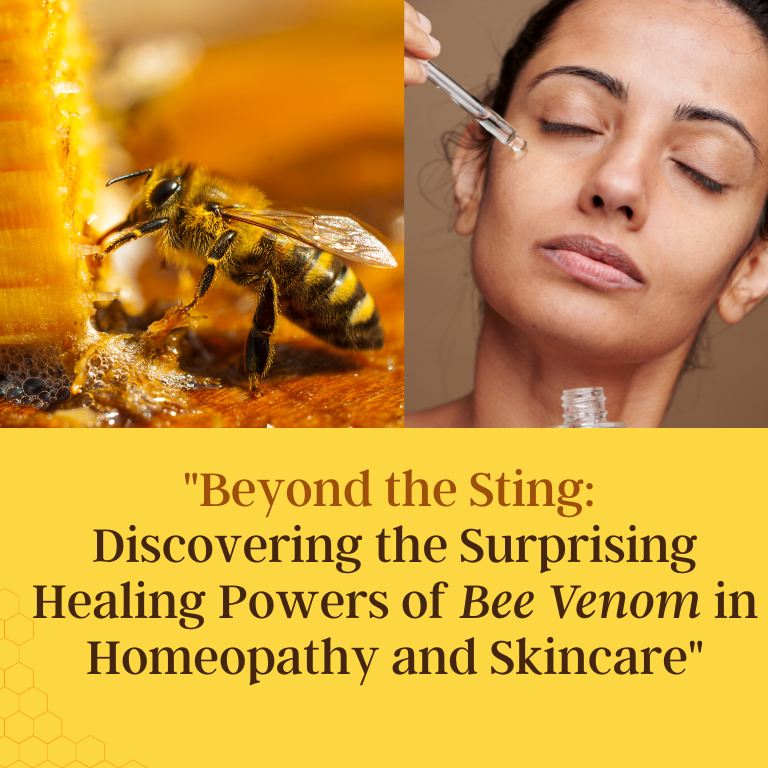
“Beyond the Sting: Discovering the Surprising Healing Powers of Bee Venom in Homeopathy and Skincare”
Have you ever heard of bee venom being used in skincare products?
It might sound a little unusual, but bee venom is becoming an increasingly popular ingredient in the world of skincare. This natural substance has a complex mixture of compounds, including melittin, apamin, and adolapin, which have potential benefits for the skin.

One of the most exciting benefits of bee venom for the skin is its potential anti-aging effects. As we age, our skin naturally loses collagen and elastin, which can lead to wrinkles and sagging.
However, research has suggested that bee venom may help stimulate the production of these proteins, helping to reduce the signs of aging and promote a more youthful complexion.
A study published in the Journal of Cosmetic Dermatology found that a topical cream containing bee venom was effective at reducing the appearance of fine lines and wrinkles in human subjects.
Bee venom may also be helpful for those with acne-prone skin. Bacteria on the skin can contribute to the development of acne, and studies have suggested that bee venom may be effective at killing certain types of bacteria.
Additionally, bee venom has been shown to have anti-inflammatory effects, which could help to reduce redness and swelling associated with acne.
In a study published in the Journal of Ethnopharmacology, researchers found that bee venom had potent antibacterial activity against several strains of bacteria commonly associated with skin infections, including Staphylococcus aureus and Streptococcus pyogenes.
Some incredible skin benefits of bee venom include :
- Improved skin texture and elasticity
- Reduced appearance of fine lines and wrinkles
- Increased collagen and elastin production
- Anti-inflammatory effects that can help reduce redness and inflammation associated with acne, rosacea, and other skin conditions
- Antibacterial properties that can help kill certain types of bacteria on the skin
- Improved skin hydration and moisture retention
- Enhanced skin cell regeneration and renewal
- Reduction in the appearance of dark spots and hyperpigmentation
- Protection against environmental damage from UV radiation and pollution
- Overall improvement in skin health and appearance.
While these potential benefits of bee venom for the skin are certainly exciting, it’s important to note that not all skincare products containing bee venom are created equal. Some products may contain only a small amount of bee venom, which may not be enough to have a significant impact on your skin.
Additionally, as with any new skincare product, you must do a patch test and speak with a healthcare professional before incorporating bee venom products into your skincare routine.

Besides skincare, bee products have a long history of use in homeopathy. Apis mellifica, a homeopathic remedy made from the Western or European honey bee, is a powerful remedy that can be used for various ailments with symptoms such as edema and inflammation.
The effectiveness of Apis mellifica has been noted since its introduction to homeopathy in 1847 by New York physician Dr. Marcy, who observed the cure of a severely edematous kidney patient after being prescribed dried and powdered honeybees by a native Indian medicine woman.
While using bee venom and bee products in homeopathy and skincare has been met with mixed reactions, many people continue to find relief from various ailments through these natural remedies.
Some interesting Facts about Bee venom’s use in healthcare:
- Bee venom has been shown to have anti-inflammatory properties, which can help reduce pain and swelling associated with inflammatory conditions such as rheumatoid arthritis and osteoarthritis.
- Some studies have suggested that bee venom may have neuroprotective effects and could be beneficial in treating neurological conditions such as Parkinson’s disease and multiple sclerosis.
- Bee venom has been found to have antimicrobial properties, which means it may help fight off bacterial, viral, and fungal infections.
- Research has shown that bee venom may have anti-cancer properties and could potentially be used in cancer treatment.
- Bee venom therapy (BVT) has been used as a complementary and alternative medicine approach for a range of conditions, including autoimmune diseases, skin disorders, and chronic pain. However, more research is needed to fully understand its effectiveness and safety.
- Bee venom is also used in cosmetics and skincare products due to its potential anti-aging and skin brightening effects.
- The use of bee venom in traditional medicine dates back centuries and is still widely used in many cultures today.
- Bee venom therapy has been practiced in Western medicine since the late 19th century and is still used today in some countries, including Germany and Korea.
- Bee venom therapy involves the controlled administration of bee venom and should only be done by a qualified healthcare professional.
- While bee venom therapy has shown promising results in some studies, it can also pose risks and potential side effects, including allergic reactions, pain, and swelling.
- In Korea, oriental medicine clinics are already using subcutaneous injections of BV as a treatment for warts.
While bee venom has numerous benefits for the skin, it’s essential to consider its ethical implications in skincare products.
Bee venom is typically harvested by electric shocks, which can harm and distress bees.
However, some companies are taking steps to produce bee venom more ethically. For example, some producers use glass plates to collect venom, which is less harmful to the bees. These glass plates are placed in front of the hive, and when the bees attempt to enter or exit, they come into contact with the plate and release a small amount of venom.
Another ethical method is the use of trained bees. Trained bees are placed on a pane of glass and stimulated with a small amount of electricity, causing them to release venom. This process does not harm the bees, and they can return to their hive after their venom is collected.
Additionally, some companies are donating a portion of their profits to organizations that support bee conservation efforts. By supporting these organizations, these companies are working to promote sustainable beekeeping practices and protect bee populations.
To conclude, while using bee venom in skincare products can offer numerous benefits for the skin, it’s important to consider the ethical implications of its production. By supporting companies that use ethical and sustainable beekeeping practices, we can help protect these critical pollinators while also enjoying the benefits of bee venom in our skincare routines.
However, it’s vital to research and choose ethically produced products that contain good bee venom. By incorporating bee venom products into your skincare routine, you may achieve a more youthful and radiant complexion while supporting bee conservation efforts.
I hope you found today’s blog post informative & helpful, please consider sharing it with someone who may also benefit from it.
Don’t forget to like and subscribe to stay updated on our latest posts and receive more helpful tips and insights.
It’s essential to keep in mind that managing hand eczema is a personalized process, and what may work for one person may not be effective for another. If you’re seeking holistic and natural remedies to heal your hand eczema and improve your skin health, I can assist you. By scheduling a discovery consultation, we can discuss your unique needs and identify the most suitable treatment options to help you manage your condition effectively. Don’t hesitate to reach out and take the first step towards achieving healthier, happier skin.
Thank you for reading
